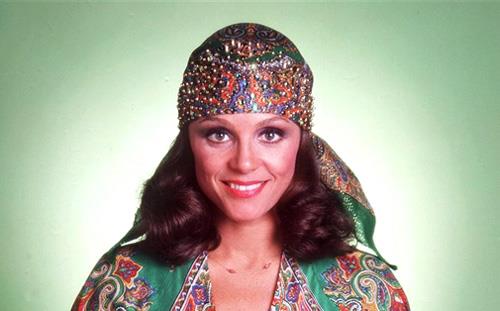
When you see crowd scenes in teen movies, you sometimes wonder what happens to all the characters who never even get named, but just fill out the floor.
Well, one of them grew up to become Valerie Harper.
Harper, who died Friday (Aug 30) in Los Angeles, eight days after her 80thbirthday, was 16 when she made her film debut in Rock, Rock, Rock!, a quickie musical released in 1956.
Starring a legitimate lineup of rock ‘n’ roll stars, including Chuck Berry, the Teenagers, Lavern Baker, the Moonglows and the Flamingos, Rock, Rock, Rock! was filmed and released at lightning speed to cash in on the rock ‘n’ roll fad before it quickly died.
Except it didn’t. And Valerie Harper kept going, too.
In Rock, Rock, Rock!, she was one of the girls who gazed adoringly at dreamy singers like Cirino and the Bowties. Two decades later she became one of the most memorable characters from the golden age of sitcoms: Rhoda Morgenstern, the faithful wisecracking friend of Mary Richards on The Mary Tyler Moore Show and then the star of her own self-titled spinoff.
The Mary Tyler Moore Show, obviously and correctly, focused on Mary. But viewers also fell in immediate love with Rhoda, probably because she embodied the thirtysomething single woman so endearingly.
True, so did Mary Richards. What Rhoda captured was another side of that woman – a little less put-together, a little less filtered. Rhoda was neurotic in different ways from Mary, which made them a brilliant team.
They weren’t an odd couple as much as comrades in arms, two soldiers who were thrown together by chance and hit it off.
Rhoda directed many of her best neurotic lines at herself, like the time she returned from a date with a sculpted god and explained that she had come to a realization as to what she considered her worst side: “the front.”
Every time the best girlfriends on later dramedies like Sex and the City would go on too long with the navel-gazing, it was fun to envision them lightening up enough to become Rhoda for two minutes.
Rhoda also benefited from the bold and smart decision by the Mary Tyler Moore Show producers to often employ Mary as the straight woman for the wacky characters around her, from Ted Knight’s Ted Baxter to Cloris Leachman’s Phyllis Lindstrom.
This gave characters like Rhoda the space to develop serious as well as comic personae.
While Rhoda’s erratic social life became a reliable bedrock running gag for the show, it wouldn’t have been nearly as effective if we didn’t know that Rhoda also had heard the chilling voice that says, “What if you never find someone?”
What also broadened her appeal was that the sitcom world of the 1970s was only starting to unbuckle its chastity belt. So Rhoda was looking for a soulmate more than a hookup.
Whatever her quest, she never let us feel sorry for her. We just wished her the best, which made it mildly ironic that her happiness and her television entertainment quotient turned out not to be the same thing.
The Rhoda spinoff began with Rhoda snagging her guy and surviving a comedy of errors to marry him.
Two seasons later she got divorced, to some extent by popular demand. Married Rhoda wasn’t as much fun as single Rhoda.
In the end, CBS cancelled Rhoda before she had a chance to wrap things up, which meant the show ended as it should have. Perhaps as a consolation prize, Harper’s real-life second marriage lasted 32 years, until her death.
Harper played a number of other roles over the years, including Tallulah Bankhead on Broadway. She voiced for The Simpsons and tripped the light fantastic on Dancing With the Stars.
But to most of the TV viewing world – and thanks to reruns, not just the elderly fringe of that world – Valerie Harper will always be Rhoda, indelible enough to go by just the one name.
Rhoda was a loyal, funny friend who dressed a little funky. She knew what we needed and also knew what we wanted – a combination that was hard to find even back when sitcoms were a common cultural language in America.
Like rock ‘n’ roll, Valerie Harper endured.